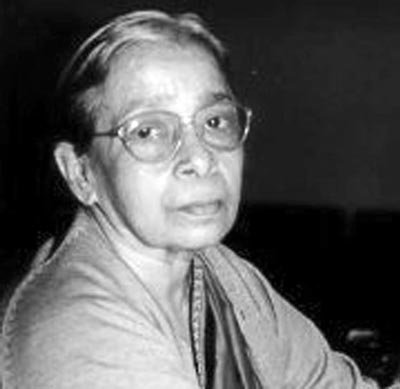
Mahasweta Devi was born in 1926 in the city of Dacca in East Bengal (modern day Bangladesh). As an adolescent, she and her family moved to West Bengal in India. Born into a literary family, Mahasweta Devi was also influenced by her early association with Gananatya, a group who attempted to bring social and political theater to rural villages in Bengal in the 1930’s and 1940’s.
After finishing a master’s degree in English literature from Calcutta University, she began working as a teacher and journalist. Her first book, Jhansir Rani (The Queen of Jhansi), was published in 1956. This work also marked the beginning of a prolific literary career. In the last forty years, she has published twenty collections of short stories and close to a hundred novels, primarily in her native language of Bengali. She has also been a regular contributor to several literary magazines such as Bortika, a journal dedicated to the cause of oppressed communities within India. In 1984, she retired from her job as an English lecturer at a Calcutta university to concentrate on her writing. She currently resides and works in Calcutta, India.
Mahasweta received the Magsaysay for her outstanding contribution to literature. She is also a winner of the Jnanpith award for journalism, literature and creative communication.
At present she concentrates and dedicates herself to serving the needs of the poor people in India, not allowing her much time to write. She spends time as an editor with a quarterly journal Vartika and Yosana. In her journal writing and editing she addresses the oppression of the Indian people. She advocates for the disadvantaged and those people of India who are considered outcasts. In all her writings she tries to depict the life of Adinag men and women. She also writes about Adivasi people like the Santhals, Ledhas, Shabars and Mivelas. She’s extremely dedicated and devoted to these tribes. Her experience in working with tribes has had a great influence in her writing.
Mahasweta has published forty books which include novels and stories in Bengali. Her mission is to continue working with the Komadic tribes, non tribal poor and people who are desolate and unprepared for India’s political system. This incredible author spends days and months living with the people she writes about. Her hands on experience are significant and alluded to in many of her writings. Her books focus in on the simplistic lifestyles of the tribes but more importantly their sufferings and feelings of exploitation.
She is the recipient of many awards including Lila Award, 1978; Saratchandra Memorial Award; Amrita Bazar Award, 1967; Tarasankar Memorial Award, 1977; Bibhuti Bhushan Smriti Samsad Award, 1990; Sahitya Akademi Award, 1979; Gyanpith Award, 1996; Magasaysay Award for literature, 1997. National civilian honours conferred on her are Padma Shri, 1986, and Deshikottama, 1999, Padma Vibhushan—the second highest civilian award from the Government of India in the year 2006.
At the Frankfurt Book Fair 2006, when India was the first country to be the Fair’s second time guest nation, she made an impassioned inaugural speech wherein she moved the audience to tears with her lines taken from the famous film song by Raj Kapoor (the English equivalent is in brackets):
This is truly the age where the Joota (shoe) is Japani (Japanese), Patloon (pants) is Englistani (British), the Topi (hat) is Roosi (Russian), But the Dil… Dil (heart) is always Hindustani (Indian)… My country, Torn, Tattered, Proud, Beautiful, Hot, Humid, Cold, Sandy, Shining India. My country.

